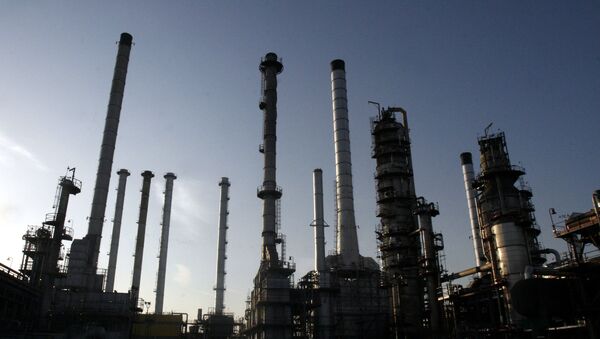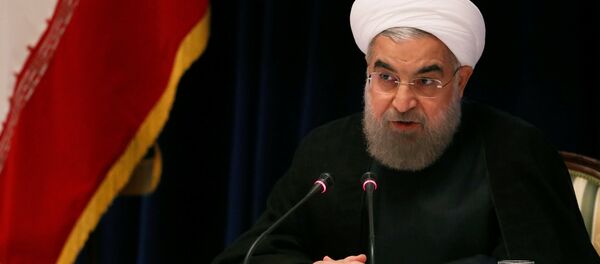New Delhi (Sputnik): With US sanctions against Iranian oil becoming fully operational by 2 May, India is likely to witness a high cost of oil import. It may also lead to inflation in oil price as a cascading effect, said Robin Sachdev, director of a New Delhi-based think-tank, the Imagindia Institute.
Calling the US move a pressure tactic to force Iran to the negotiating table, Robinder Sachdev, in a conversation with Sputnik, elaborated on the implications of the US decision to end sanctions waivers for countries like India that import Iranian oil in large quantities.
Sputnik: The US has toughened its stance on Iran and has announced that it will no longer exempt countries from sanctions, aiming to impose a complete oil embargo on Iran. How does this impact the world economy?
Robinder Sachdev: The impact of US sanctions on Iranian oil will exert an upward pressure on oil prices globally. This will in turn push up the oil import bill for everyone, and especially for countries like China and India. Though the US claims that prices will not go up much since there is surplus capacity which Saudi Arabia and the UAE will bring into the market, the choices before importers of Iranian oil are clear: either buy from alternate sources and pay more, or try some ways of getting around the sanctions, and in the process even take some risks of running afoul of US laws.
READ MORE: Iran Can Export as Much Oil as It Needs — Supreme Leader
Countries like China and India have been exploring ways of payments to Iran either through some barter mechanisms, or through non-dollar denominated trade via banking channels that avoid dollar payments. However, if the US decides to take stern action against any entities linked to Iran, then it will be very difficult to circumvent the sanctions, since most importing organisations have exposure to the international financial networks, and have linkages and presence in the US markets. The US is therefore in a position to implement any punitive action on those organisations that flout US sanctions.
As the dollar purchases will go up when countries move away from Iran, resulting in buyers needing more dollars, it may also be expected that the US dollar will get stronger in the currency markets. Meanwhile, the increase in oil prices will have a cascading effect on retail inflation in the importing countries.
READ MORE: No More Sanctions Waivers for Iranian Oil: US Policy Against Iran Illegal — Prof
Sputnik: Why does the US want to isolate Iran?
Robinder Sachdev: The US wants to isolate Iran in order to change Iran's behaviour in the Middle East. The US holds Iran responsible for its detrimental interferences in the region, and also for pursuing a missile and a nuclear programme. President Trump walked out of the nuclear deal with Iran because he believes that the deal did not go far enough, and that it was limited only to the nuclear programme. Trump wants a comprehensive deal, one which includes a change in the [Iranian] nuclear, missile, and foreign policies in the region.
The US believes that Iran is playing a destabilising role in the region and threatens American interests, as well as the interests of its friends, like Israel and Saudi Arabia. The US sanctions, therefore, are aimed at bringing Iran to the negotiating table, getting it to give up its nuclear and missile programmes, and to roll back its interferences in the Middle East.
Robinder Sachdev: The ending of waivers by the US will push up the oil import bill, and with it the retail inflation in India.
A higher pay-out for oil will also squeeze fiscal budgets for some government schemes and expenditures in India. It may be interesting to share that right now, India is in the midst of elections, and the principal opposition party, the Congress, has already started saying that if Prime Minister Modi is re-elected, then oil and diesel prices will go up in India.
Beyond economic impact the sanctions will also cloud India's relations with Iran. It will affect the implementation of the Chabahar Port project, which India is developing in Iran as an entry and access route to Afghanistan and Central Asia, bypassing Pakistan.
The irony is that the United States, too, wants an alternate access to Afghanistan, other than via Pakistan, so India will work to protect the Chabahar project from sanctions.
READ MORE: US Trying to Put Pressure on Iran to Push for Regime Change – Moscow
Robinder Sachdev: If a push comes to a shove, China will need to toe the US line, but the US will have to work very hard. China and Turkey have already questioned the US policy and are unwilling to agree to a world order where unilateral sanctions from America have to be honoured by them. In this matter, even India has said that it will comply with any UN resolutions, but cannot support unilateral sanctions.
The key is that the US is tightening the screws on Iran, and all countries are dependent on the international financial network — which is virtually controlled by the United States. Thus, importing organisations and banks involved in any sale-purchase in dollar-denominated forex are either vulnerable to technical blockages when dealing in US dollars, or are legally exposed themselves. The legal entanglement may come through their partnerships, businesses, operational areas that are in jurisdictions of American law, through ownerships, company registrations, or through NYSE or NASDAQ listings, etc.
It must also be noted that the US and China are in the midst of trade negotiations which will shape the future of US-China relations, and the global economy for the next five to ten years or more. Therefore China will seek to maximise any concessions it gives on the Iran oil embargo, with some give and take in the US-China trade negotiations.
The views expressed in this article are those of the speaker and do not necessarily reflect those of Sputnik.






